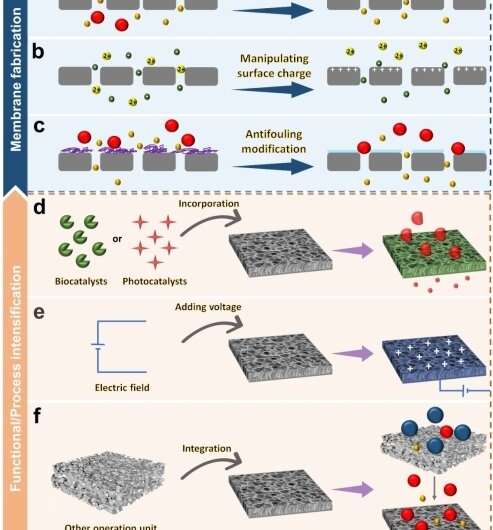Schematic diagram of strategies for enhancing selectivity of NF membranes (a-c) during membrane fabrication or (d-f) through function or process intensification. Credit: ZHANG Huiru
Researchers from the Institute of Process Engineering (IPE) of the Chinese Academy of Sciences, Argonne National Laboratory (Argonne), and the University of Chicago in the U.S. have searched for, and summarized, recent developments in the field of nanofiltration (NF), and provided guidance for potential future approaches to improve the selectivity of nanofiltration membranes.
The study was published in ACS Applied Materials & Interfaces on August 12.
Water filtration membranes have been widely applied in water treatment facilities, semiconductor manufacturing sites, and within the food and beverage industry, due to its competitive cost and effectiveness.
NF membranes have attracted much attention as they can efficiently separate monovalent and multivalent ions, as well as small organic molecules with different molecular weights.
However, most investigations involving NF membranes focus on improvement of membrane permeance, leaving selectivity behind.
In the study, the researchers comprehensively reviewed the latest strategies for NF membrane selectivity improvement. They concentrated on membrane fabrication approaches including pore size or pore-size distribution adjustment, charge distribution manipulation, and surface anti-fouling modification. Then they emphasized studies on function/process-intensified-NF for enhancing NF membrane performance.
They also offered perspectives on potential opportunities in future research. NF selectivity would be rooted in engineering of membrane interfacial properties, which underlie both advantageous properties such as surface charge for electrostatic rejection and deleterious properties such as propensity to fouling. Innovation in operating processes would also play a key role in improving the selectivity of nanofiltration membranes, as transmembrane pressure, pH, and recycling ratio of feed solution during operation processes affect the selectivity.
"The article would facilitate future investigations in separation selectivity of NF membranes, and the researchers would pay more attention on this important issue," said Prof. Luo Jianquan from IPE.
Dr. Seth B. Darling, a co-author from Argonne, noted that this review "shed light on cutting edge developments in selectivity in NF membranes, and no doubt would encourage more researchers participating in this exciting filed."
More information: Huiru Zhang et al. Sharpening nanofiltration: Strategies for enhanced membrane selectivity, ACS Applied Materials & Interfaces (2020). DOI: 10.1021/acsami.0c11136
Journal information: ACS Applied Materials and Interfaces
Provided by Chinese Academy of Sciences
























